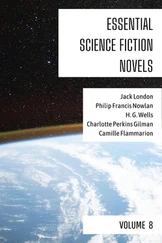This scientific supernaturalism concerns itself with mortal life, not with immortality as do some of the other aspects of the genre . It is concrete in its effects, not spiritual. Its incursions into futurity are earthly, not of heaven or hell, and its problems are of time, not of eternity. The form shows how clear, cold intelligence plays with miracles and applies the supernatural to daily life. The enthusiasm, wild and exaggerated in some ways, that sprang up over the prospects of what modern science and investigation would almost immediately do for the world in the latter half of the nineteenth century, had no more interesting effect than in the stimulating of scientific fictive supernaturalism. And though mankind has learned that science will not immediately bring the millennium, science still exercises a strong power over fiction. This type shows a strange effect of realism in supernaturalism, because of the scientific methods, for supernaturalism imposed on material things produces an effect of verisimilitude not gained in the realm of pure spirit. Too intellectually cold for the purposes of poetry, too abstract and elusive for presentation in drama, and too removed by its association with the fantastic aspects of investigation and the curiosities of science to be very appropriate for tragedy, which has hitherto been the chief medium of expressing the dramatic supernatural, science finds its fitting expression in prose fiction. It is an illustration of the widening range of the supernatural in fiction and as such is significant.
by Yevgeny Zamyatin
In submitting this book to the American public the translator has this to say.
The artistic and psychological sides of the novel are hardly to be discussed in a preface. Great as the art of a writer may be and profound as his psychology may seem to one, the impression is largely a matter of individual variations, and this side must naturally be left to each individual’s judgment and sensibilities.
There is, however, one side of the matter which deserves particular mention and motivated emphasis.
It is perhaps for the first time in the history of the last few decades that a Russian book, inspired by Russian life, written in Russia and in the Russian language, should see its first light not in Russia but abroad, and not in the language it was originally written but translated into a foreign tongue. During the darkest years of Russian history, in the ’forties, ’sixties, ’eighties and ’nineties of the last century, many Russian writers were forced by oppression and reaction to live abroad and to write abroad, yet their writings would reach Russia, as they were intended primarily for the Russian reader and Russian life. Most of Turgeniev’s novels were written while he was in France, and with the exception of his last short story which he dictated on his deathbed, all his novels and stories were written in Russian. Hertzen, Kropotkin, and at one time Dostoyevski, were similarly obliged to write while away from their native land.
Here is a book written by an artist who lived and still lives in Russia, and whose intimate love for Russia and her suffering is so great that he finds it impossible to leave Russia even in these days of stress and sorrow. But his book may not appear in the country where it was written. It is a great tragedy—this spiritual loneliness of the artist who cannot speak to his own people. In bringing out this book in English, the author tries to address himself to the world without having the opportunity of being heard by his own people. This situation, however, is to a great extent symbolic of the spiritual mission of Zamiatin, for no matter what the language in which he originally writes, and no matter how typically national his artistic perception and intuition, he is essentially universal and his vision transcends the boundaries of a purely national art. Moreover, is it not true that the more genuinely national a man’s art, and the more sincerely national his personality, the more is he universal? Abraham Lincoln is more than an American national figure, and I doubt if the appeal Lincoln’s personality makes would be universal as it is if he were not so typically American. It is difficult to find personalities more national than Tolstoi or Dostoyevski, and this is perhaps the reason why they stand out as two of the most typically universal minds with a universal appeal that the nineteenth century gave us.
Zamiatin is not so great as the men referred to above, but despite his youth, he already proves to be the bearer of that quality of greatness which characterizes a personality with a universal appeal.
We is, as Zamiatin himself calls it, the most jocular and the most earnest thing he has thus far written. It is a novel that puts most poignantly and earnestly before every thoughtful reader the most difficult problem that exists today in the civilized world,—the problem of preservation of the independent original creative personality. Our civilization today depends upon the energetic movement of great masses of people. Wars, revolutions, general strikes—all these phenomena involve great masses, large groups, enormous mobs. Despite the fact that there is hardly a corner in the world today where the average man does not make the trite complaint, “What we need is leadership,” the world today seems for a time at least to have lost its capacity for producing real leaders. For our great successes in mechanical civilization, our exceptional efforts in efficiency, tend to bring into play large numbers rather than great individualities. What under these conditions is the lot of a creative individuality? What the tragedy of an independent spirit under present conditions is, is pointed out in an unique way in We . The problem of creative individuality versus mob is today not a mere Russian problem. It is as poignant under Bolshevist dictatorship as it is in Ford’s factory.
Of course the sincere, honest and frank treatment of this problem seems offensive to anyone who prefers to be a member of a mob or keep this or that part of humanity in the state of a mob. That is why We could not see light in Russia, and will probably be disliked by those whose spiritual activities are reduced to the mechanical standards of a mechanical civilization which is devoid of original creative effort.
A few words about the method by which Zamiatin tries to drive home to the reader his main ideas. It is the method of “Laughter through tears,” to use an old expression of Gogol. It is the form which is dictated by profound love for humanity, mixed with pity and hatred of those factors which are the cause of the disindividualization of man today. It is the old emotion of the ancient Catul: “Odi et amo.” Zamiatin laughs in order to hide his tears, hence amusing as We may seem and really is, it barely conceals a profound human tragedy which is universal today.
The reader may be interested in knowing something about Zamiatin himself. Zamiatin does not like to tell about himself and the translator does not think he has the right to tell more than to quote Zamiatin’s own answer to a request addressed to him a couple of years ago to write his autobiography:
“I see you want my autobiography by all means, but I assure you that you will have to limit yourself only to an outside inspection and get but a glimpse, perhaps, into the dark windows. I seldom ask anybody to enter.
“As to the outside, you will see a lonely child without playmates, lying on a Turkish divan, hind-side up, reading a book, or under the grand piano while his mother plays Chopin. Two steps away from Chopin, just outside the window with the geraniums, in the middle of the street, there is a small pig tied to a stake and hens fluttering in the dust.
Читать дальше












